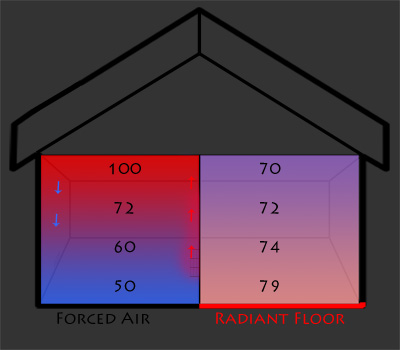

Think of radiant heating like warming yourself over an electric stove. That heat makes direct contact with those surfaces and is transferred to you via radiation. Radiant heating systems heat your floor, baseboards, walls or ceilings using a network of pipes that are heated via electricity or hot water (from a boiler or water heater).

Unlike forced-air systems, radiant heating systems don’t heat your home’s air but instead heat your home’s surfaces. The most common forced-air heating systems include furnaces and heat pumps. Learn more about the heating services we offer or…Ī forced-air system is exactly what it sounds like…a heating system that heats air and blows (or forces) that heated air around your home.įorced-air systems work by pulling in cold air from your home, heating it and then forcing that air throughout your home via ductwork.
#ELECTRIC RADIANT FLOOR HEATING VS FORCED AIR INSTALL#
We have a lot of experience helping Pittsburgh homeowners install and maintain their heating systems, and we’d be happy to provide you with expert recommendations as well. Want a professional’s opinion? We’ve got you covered. Other factors you should consider when making the choice between radiant or forced heating, include:īelow, we’ll go into each of these considerations in more detail, so that you can get a better idea of whether radiant heat or forced air is the best option for your Pittsburgh home.īut first, let’s take a look at how these systems work in the first place. However, radiant heating systems are much more expensive to install than forced-air systems, so if you’re like most Pittsburgh homeowners, a forced-air system will be the better option for your budget.

A radiant heating system will provide more even heating and is more energy-efficient for your home. If the sky’s the limit when it comes to your budget, we would suggest a radiant heating system. This is a hard question to answer, but here’s our advice:


 0 kommentar(er)
0 kommentar(er)
